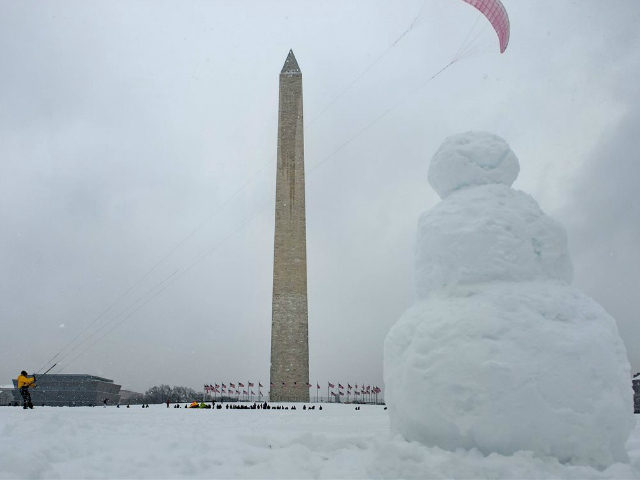Baby, it’s cold outside.
Bitter cold has set in across much of the Midwest and Northeast after snow blanketed a wide swath of the country in snow, sleet, and rain this past weekend.
Wind chills have plunged temperatures into the single digits in the New York City area. Howling winds are making it feel like it is minus seven degrees. Temperatures in Upstate New York are expected to reach minus 40 degrees Fahrenheit, the National Weather Service (NWS) predicted.
In New England, temperatures are predicted to fall to as low as 20 degrees below zero around Boston and as low as 35 below zero in parts of Vermont, Maine, and New Hampshire, the NWS said.
While the cold and snowy weather will have immediate effects of increasing fatalities and traffic accidents and throwing air travel into chaos, it is also likely to have significant–albeit temporary–impacts on the economy.
Conventional wisdom holds that weather has large effects on economic performance. Media reports often cite weather when signs of an economic slowdown show up. And executives at public companies are notorious for blaming unseasonable weather for worse-than-expected performance.
Another part of the conventional wisdom has it that the economy tends to “snap back” from weather effects. If extreme cold or snow holds back homebuilding, in one month, for example, those projects just get pushed off into warmer months. Hiring that gets delayed due to weather simply happens when it is not so terrible outside.
There is good reason for this economic folklore: it’s rooted in centuries, even eons, of human experience.
As Justin Bloesch and François Gourio, economists at the Federal Reserve Bank of Chicago, have written:
The idea that weather is an important source of fluctuations of production is an old theme in economics. A century ago, when the economy was still in large part driven by agriculture, bad crops had a measurable effect on aggregate income. Thus, the Dust Bowl had a notable effect during the Great Depression. Weather may continue to have a significant economic impact in countries that are very reliant on agriculture, either because they are poor or because their exports are concentrated on a small number of crops.
For most of human history, however, it was difficult to measure the effects of weather on the economy because we lacked reliable data on temperatures and even snowfall on a nationwide basis. But thanks to innovations in data processing and statistical analysis, we are getting a clearer picture of what changes in the mercury levels mean for our economy.
And as it turns out, the folklore mostly got it right.
According to a 2017 study by Bloesch and Bourio, weather has a significant but short-lived effect on economic activity. It matters most for utilities, construction, hospitality, and–to a lesser extent–retail. In other parts of the economy, the effects are noticeable but not all that powerful.
“Some industries stand out as particularly affected, notably construction, hospitality, and, to a lesser extent, retail. Manufacturing is affected more by temperature than by snowfall,” they found. “Overall, the results suggest that both the ‘supply’ and ‘demand’ channels are at work during the weather-related slowdown; that is, some sectors contract because it is impossible to produce, while some contract because there is less demand for their services.”
Frigid temperatures and heavy snow can slow down hiring–but not by much.
“A one standard deviation shock to either snowfall or temperature moves new [unemplopyment] claims by about 1 percent and housing starts and permits by 1–2 percent,” they write.
But both housing starts and unemployment claims are very volatile, so the effect of a one percent change actually is not all that important. The unemployment rate rises when weather is extremely cold but only by a little.
In any case, these effects are short-lived. Within a few months, the economy tends to make up for shortfalls from bitterly cold weather.
Another study, by Daniel Wilson of the San Francisco Federal Reserve Bank, found that snowfall has a bigger effect than frigid days. What’s more, the impact of snow appears to last longer than other effects.
“[P]recipitation and snowfall have clear negative contemporaneous effects. But precipitation’s effect is offset by higher growth in the next three months, while snowfall’s four-month cumulative effect remains negative,” Wilson wrote.
So as an economist might put it, bundle up if you are going outside: it’s a few standard deviations below normal out there. But if the next release of jobs data shows hiring slowed, do not panic. The economy is likely to defrost when temperatures climb again.
–The Associated Press contributed to this report.

COMMENTS
Please let us know if you're having issues with commenting.